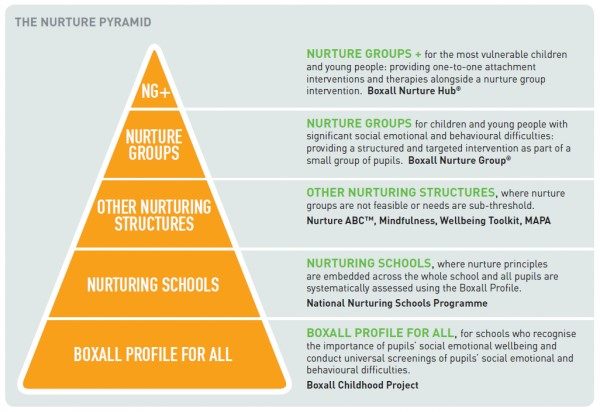Nurture at Brae High School
There are different levels of nurture which are embedded across our school, see The Nurture Pyramid below:
Figure 1. The Nurture Pyramid is the model NGN uses to map out the different levels encompassed in the graduated approach to nurture. At the bottom tier, all pupils should be assessed using the Boxall Profile so that their needs can be identified and answered early; at the very top, the most vulnerable pupils should receive targeted 1-to-1 interventions such as Nurture Groups +.
The Boxall Profile
The Boxall Profile is a unique online assessment tool we use to develop a precise and accurate understanding of individual children’s social and emotional strengths and needs, and to plan effective interventions and support activities. It is widely used across the UK by various professionals to identify that a pupil may have social, emotional and behavioural difficulties (SEBD), although increasingly schools are using the Boxall Profile to gain a better understanding of the wellbeing of their whole school populations. By profiling all children in a school, the staff have a more rounded view of the children and young people in their care and their needs. The Boxall Profile is easy to use and a very cost effective resource. (Information taken from https://www.nurtureuk.org/)
Nurturing School
As a school we are working towards embedding the nurturing principles and practice at a whole school level to ensure all pupils are benefitting from a nurturing relationships approach.
Research shows that children’s learning is most effective when they feel safe, have a sense of emotional wellbeing, good self-esteem and a feeling of belonging.
The philosophy of a nurturing approach is drawn from the six principles of nurture:
- Children’s learning is understood developmentally
- The classroom offers a safe base
- All behaviour is communication
- The importance of nurture for the development of wellbeing
- Language is a vital means of communication
- The importance of transition in children’s lives.
Nurture Groups
The Home Room is a place of learning where nurturing sessions can take place. The Home Room is an invaluable resource at Brae High School. It provides a bridge between home and school; a place where pupils can feel safe and secure to explore their emotions, learn about themselves, develop and grow.
Our highly experienced staff are specifically trained to work with individuals or small groups. Sessions are carefully planned, using activities and resources to motivate, engage and support pupils. Before pupils attend nurture provision, staff will contact parents/carers and discuss their child’s needs and a Boxall Profile Assessment will take place. Parental and carer involvement is a crucial part of the success of our nurture groups.
Which Pupils attend the nurture group?
Pupils may attend the nurture group for specific reasons, for example:
- Distressed behaviours within school
- Forming and sustaining positive relationships
- Bereavement
- Family illness or break-up
- Quiet and withdrawn
- Find it hard to listen to others or join in
How will the nurture group help my child?
Overtime, attending the nurture group will boost confidence and self-esteem. Pupils will further develop their social skills and independence, for example:
- To join in group activities
- To share and take turns
- To develop concentration levels
- To build up resilience
- To form friendships
- Develop positive relationships with school staff
- To gradually settle into their mainstream class
How long will my child be in the nurture group for?
Sessions run up to five times per week, depending upon the age of the pupils attending. Pupils usually attend for no longer than four terms. Nurture staff work closely with class teachers to ensure a smooth and successful transition back to class full time after this period.
Are parents/carers involved?
Our door is always open and therefore welcome parents/carers to visit. Special event invitations are sent out to parents/carers to join us for a variety of reasons such as: open afternoons and end of term celebrations.
What is a typical session in the nurture group?
The group follows a simple structure and routine which includes
- group listening and speaking
- completing tasks/activities
- developing social skills (often play based)
- preparing and eating a snack together.
The group runs on consistency, positive interactions and recognising and celebrating achievements. Pupils understand what they are learning and what their individual targets are. Pupils have the opportunity to share news, explore thoughts and feelings and work collaboratively on practical tasks. Outdoor learning is an important part of the sessions.
Further Information
For further information on nurture, please see:


